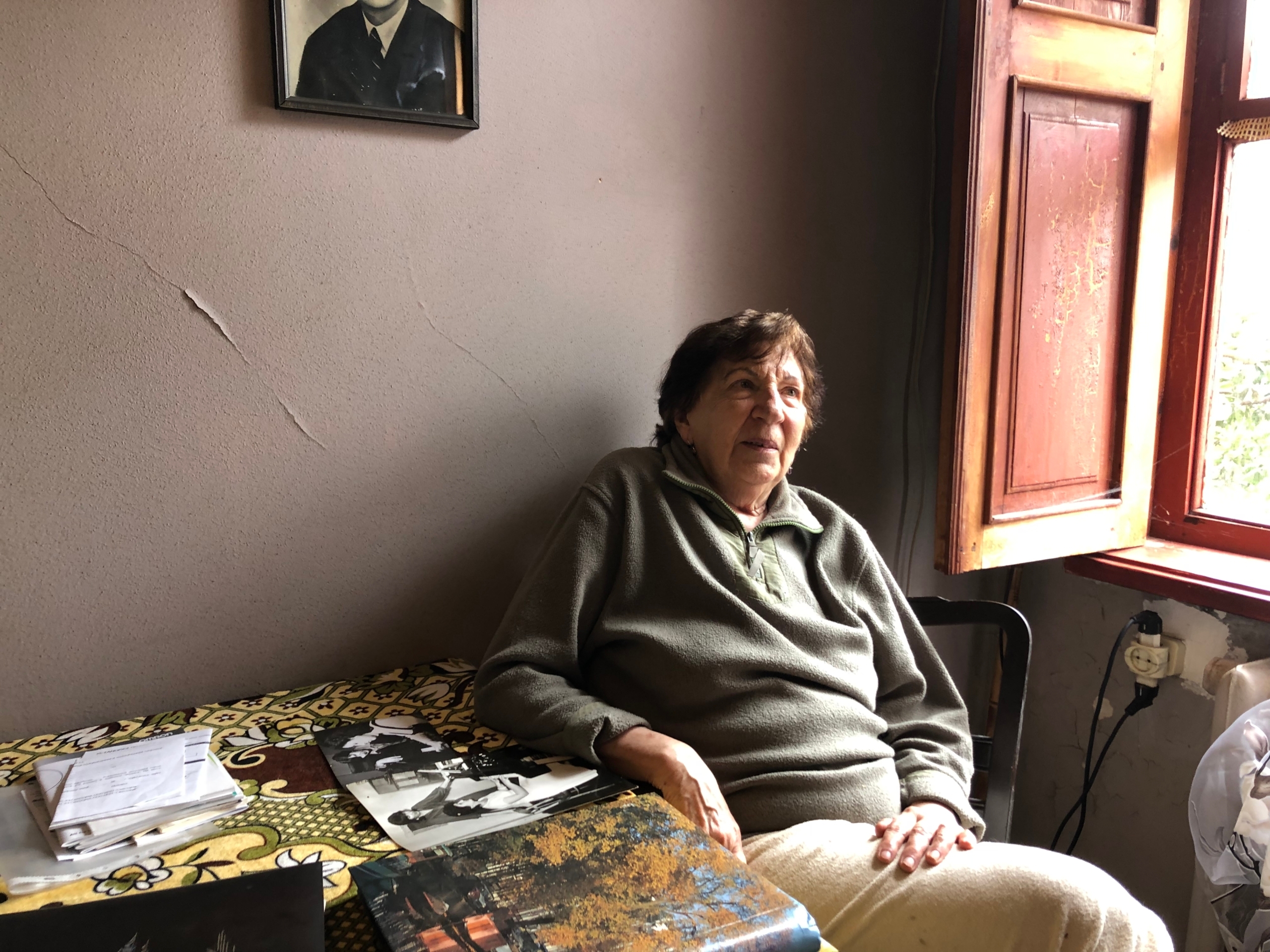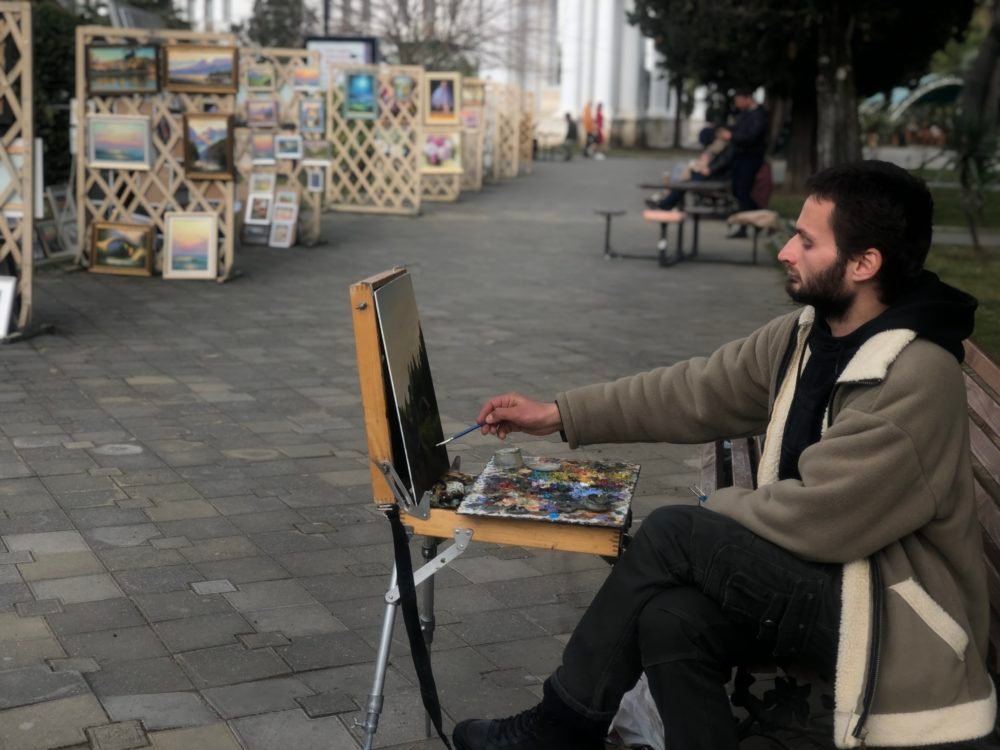
For nearly 100 years, the Greeks in Abkhazia have been part of its multiethnic community and comprised almost half of the population of Sukhum/i.
Eleonora Kozmidi, 86, is ethnically Greek and was born and raised in Abkhazia. For nearly 60 years she worked at the Sukhum/i State Musical College as a teacher.
Kozmidi’s family was forced to leave Turkey in 1913, and settled in the village of Tsebelda, Abkhazia.
“We used to live in Mramba, and my dad had ten siblings. He moved to Sukhum/i and began working as a concierge. Later, he got a job as a driver for the government, and he knew many of the people who were later executed. We continued living like this until Beria and Stalin made the decision to deport the Greeks to Kazakhstan,” she recounts.
There was a significant Greek community in Sukhum/i, and approximately fifty Greek villages all around Abkhazia. In 1949, a major deportation of Abkhazian Greeks took place; around fifty thousand were forcibly relocated to Kazakhstan. With the outbreak of the war in 1992-1993, approximately 15,000 Greeks left Abkhazia seeking refuge from the hostilities. According to Dmitry Sevastidi, the current head of the Greek community in Abkhazia, there are currently only around 2,500 Greeks residing in the region.
Not all Greeks were deported. According to Kozmidi, “If a Greek family had Soviet passports and held valuable positions, they were allowed to remain in Abkhazia. However, many were deceived during the deportation process, being told they were being sent to their ancestral homeland.”
Kozimidi’s family was one of those who were exiled.
“After Stalin’s death, the restrictions were canceled and Greeks gradually started returning to Abkhazia. However, most of them chose to leave for Greece. My family was among those who decided to return to Abkhazia.”
In 1938, the communist authorities started closing down national schools, including Greek schools. Education in the city transitioned into Russian-language education, and in the villages, changed to Georgian. As a result, many Greeks who held Greek citizenship, according to Kozmidi, left in large numbers for their ancestral homeland.
“My father always urged me to permanently move to Greece, but I was always drawn to stay here. Despite the fact that I knew neither Georgians nor Abkhazians saw someone like me as someone who should be in a position of authority. My aspirations were limited to becoming the head of a department; I couldn’t aim for anything more. Although there was an opportunity after the war to become the director of the school, I, as a Greek woman, was not allowed to take on that role.”
During the war of 1992-1993, the path to Greece was opened for many Greeks, but not all of the Abkhazian Greeks chose to go there.
Just like the Kozmidi family, “During the war, they came to us, they asked: ‘Do you want to leave?’ and my father said, ‘No, I don’t want to. If there is an order, show it to me – I will obey.’ And that’s it, they left us,” she recalls.
When the Georgian-Abkhaz war started Eleonora Kozmidi was 55 years old.
On September 5, 1992, she was arrested and placed in solitary confinement, later transferred to a punishment cell. The Georgians were aware that she had recently collected signatures among the non-Abkhaz and non-Georgian population for a letter advocating a curfew in Sukhum/i. As she explains, there were some obvious tensions between Abkhazians and Georgians which made her think that a fight between them was possible.
“When the conflict began, I naturally sided with the Abkhaz. They were being persecuted, and the Georgians had more power,” Eleonora explains, noting that the tension in the air was palpable even before the war broke out.
For collecting those signatures, Kozmidi spent more than three months in prison. She recalls, “I endured 97 days and nights in a punishment cell under terrible conditions. There were moments of great hardship in prison and the conditions in the cell were unbearable. But what can I say, so much time has passed, and everything is now behind me,” she reflects.
According to Kozmidi, even though some families were able to return to Abkhazia after the war, the Greek community has permanently lost its power and influence. She states, “I was never really part of this community, neither then nor now. I don’t see any significance in it.”
Kozmidi has dedicated her life to educating numerous generations of musicians and has received state recognition, but now experiences a sense of loneliness. When discussing her identity, she reveals that she does not strongly identify with her Greek heritage, stating,
“I don’t feel like a Greek, I don’t know much about Greek culture.”
The young artist Yanis Jumiliadi is one of the regulars at the Sukhum/i vernissage on the embankment. He has been exhibiting his work there for ten years.
The events of 1949 are deeply etched in the memory of every Greek, and they often recount them to the younger generation. Janis remembers how the day after the expulsion of the Greeks from Abkhazia, on June 17, 1949, the Sukhum/i city market stood empty. Janis further shares that his grandfather was among those exiled when the Abkhazian Greeks were sent to Kazakhstan. The impact of these events continues to resonate within the Greek community’s collective memory.
“‘Greeks can survive anywhere, my grandfather used to say,” Janis Jumiliadi recalls.
Janis’ great-grandfather worked in a military hospital and they lived near the village of Chernigovka, where their ancestors owned a house. While many relatives of Janis left to live in Greece, his father, grandfather, and great-grandfather decided to stay and build their lives in Abkhazia.
“The Greek community in Sukhum/i and in Abkhazia was quite big. My great-grandfather and grandfather were part of it, and of course, the atmosphere in the community was different back then. At that time, there were up to 50 Greek villages in Abkhazia, a Sukhum/i Hellenic society, and many entrepreneurs and merchants. The Greek school was opened in 1909, and there was also a Greek church. Many houses in the center of Sukhum/i were built by the Greeks, and they lived very prosperously. They worked hard, and Sukhum/i was then known as little Greece,” says Janis with a smile.
Most of his friends today are fellow artists with whom he meets every morning on the coast. They work together, drink coffee, sell paintings to tourists, and are an integral part of the Sukhum/i coastline.

